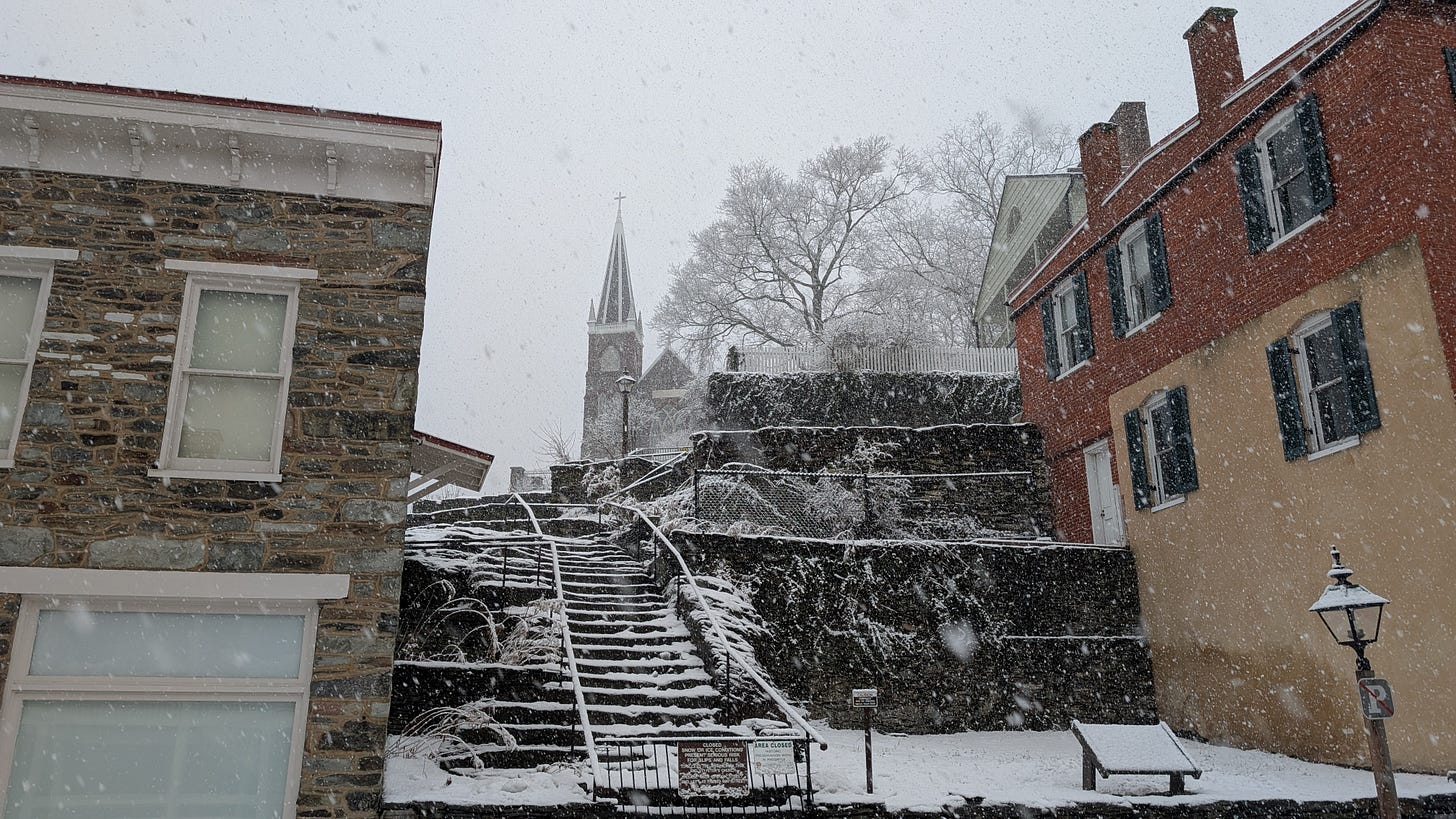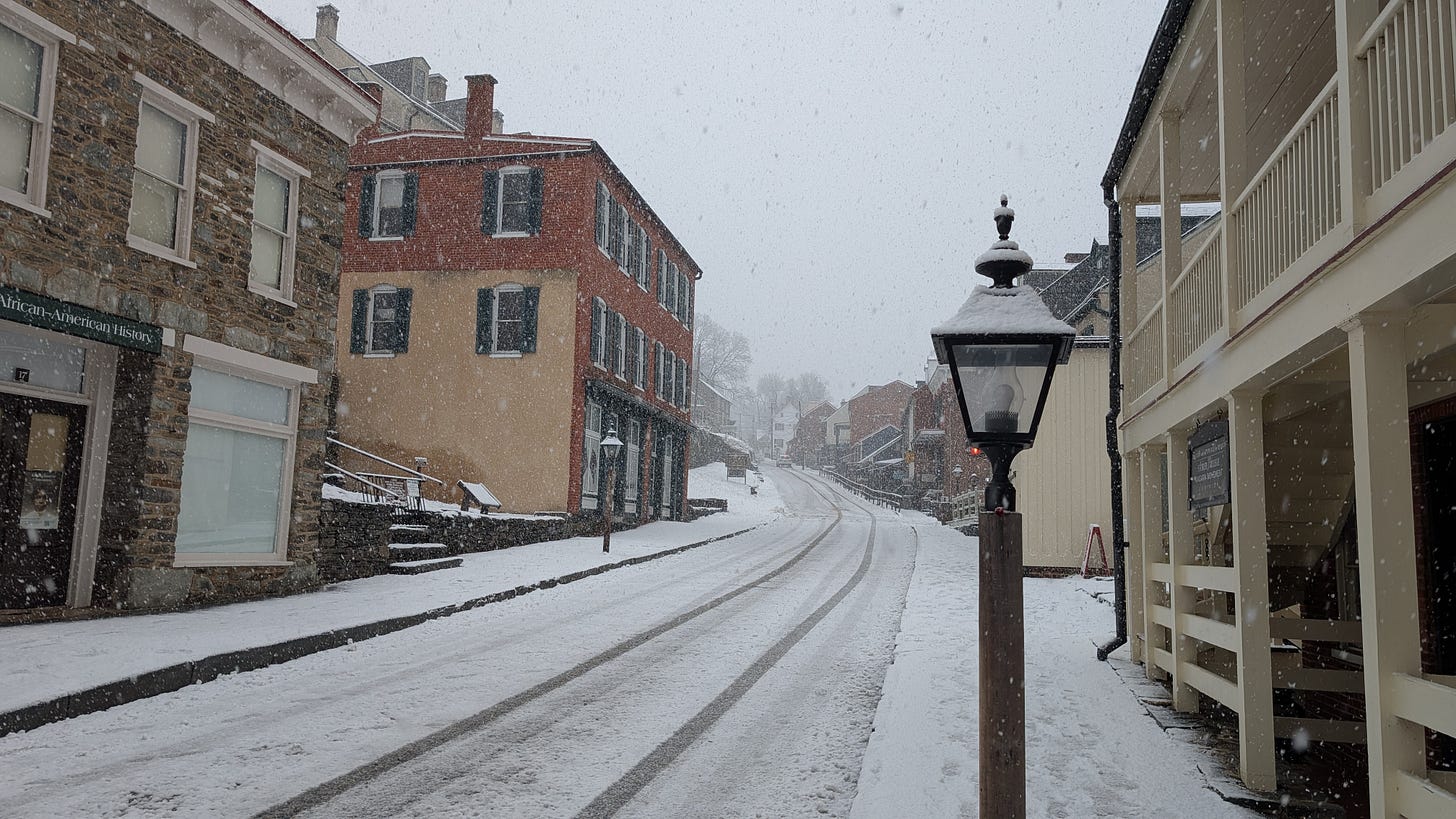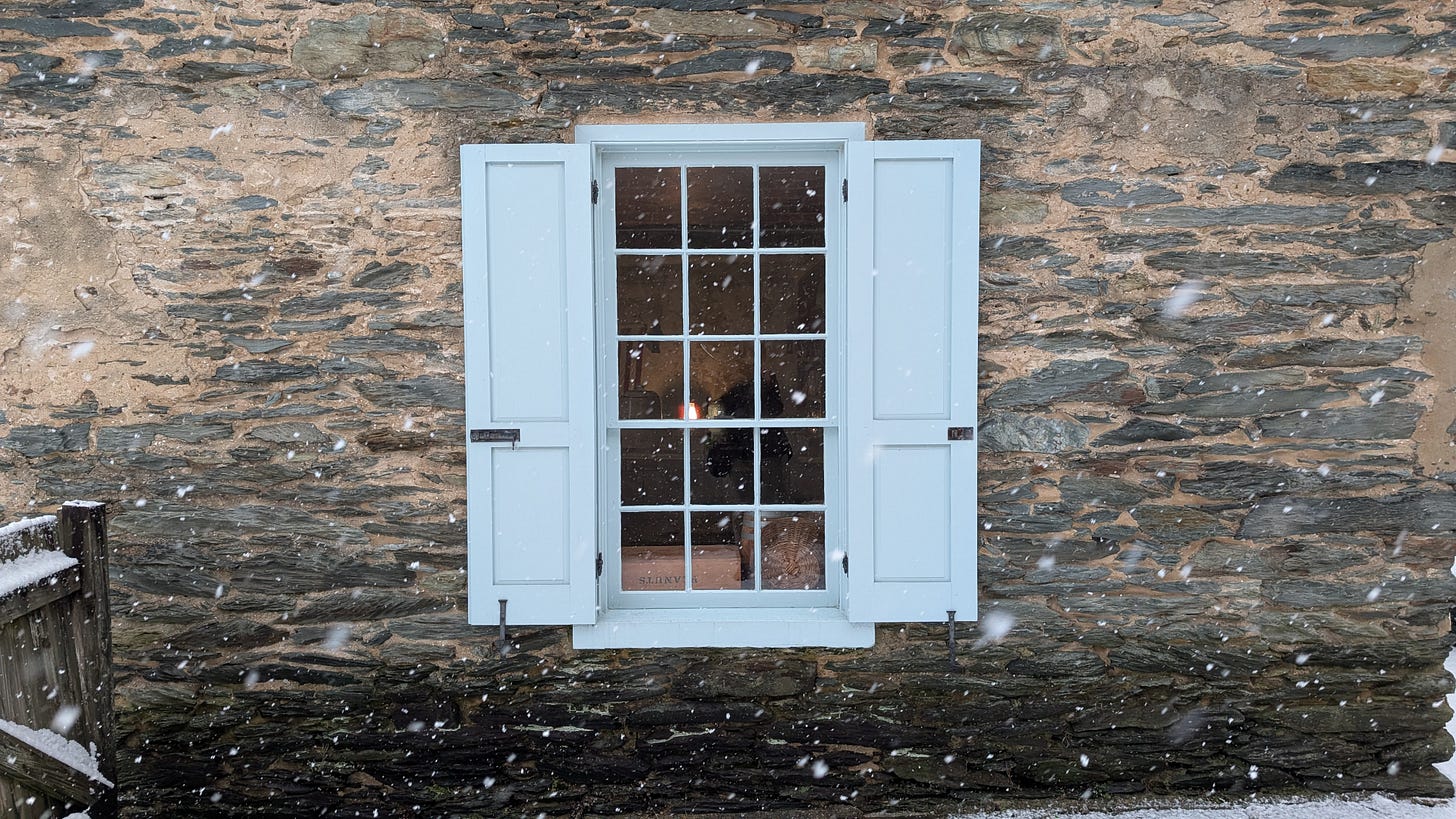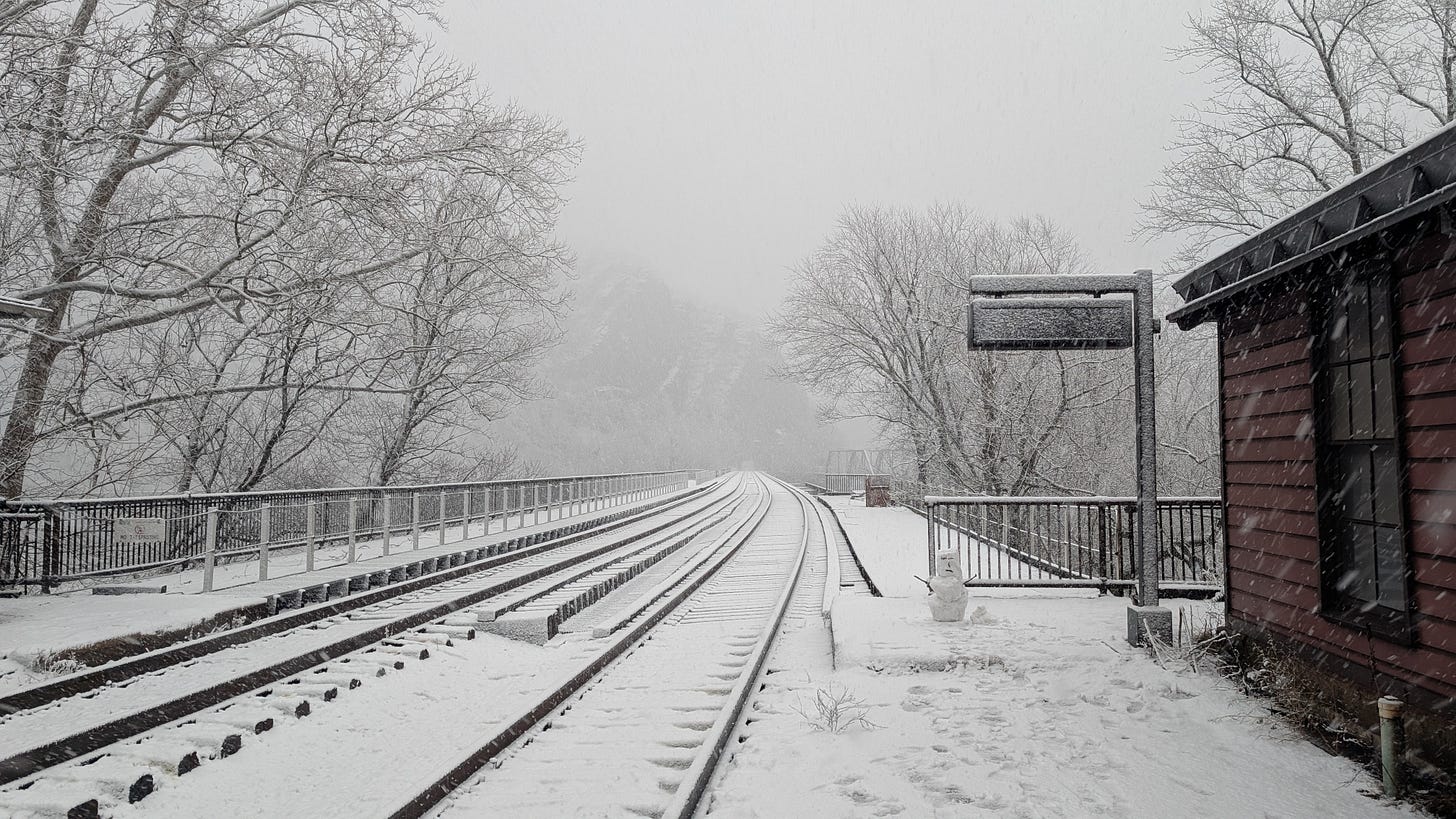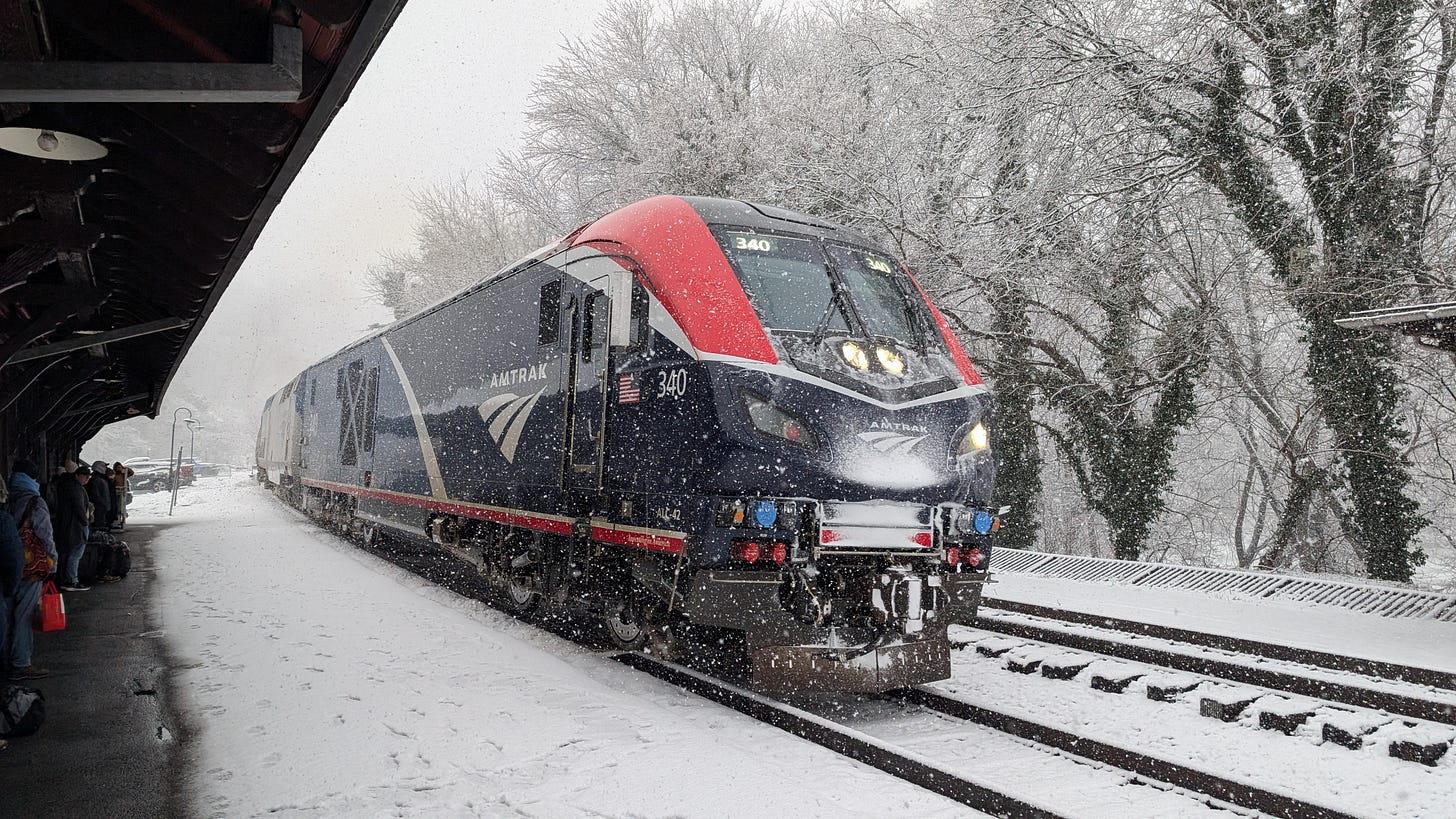Welcome to another Research Notes, where we at History’s Confluences highlight books, articles, and other history-related content that we’ve found interesting, engaging or insightful.1
A few weeks ago, I headed out to Harpers Ferry National Historical Park in West Virginia, where I had a chance to reflect on its history, check out some of the local businesses, and take some time to go hiking (as I’ve recently written about). Harpers Ferry is a place I often return to. Not only is it a great place to visit, but much of my career trajectory was shaped by a college internship I had here. It’s fair to say that History’s Confluences wouldn’t exist without this park.
On the day I was due to return home, it started to snow and I was able to get some nice photographs before my train arrived.
Being in Harpers Ferry, where my public history journey began, also prompted me to reflect on History’s Confluences. With this publication approaching its two year anniversary, I wanted to get some reader feedback as I think about future articles. Responses to these polls are very much appreciated.
As I worked on this post, I heard the news about the recent mass layoffs of National Park Service employees. Kevin Levin at Civil War Memory has a good overview of what happened here. A big of part of why the national parks are the national treasures that they are is because of the dedicated employees who work to both protect them and accurately and honestly share their history. The layoffs, combined with the pause on hiring seasonal employees (only recently lifted) create several serious challenges for many NPS units as they head into the busy summer season. Likewise, terminating so many employees just as they’re starting their NPS careers is not conducive to building a workforce that can effectively tackle the challenges facing the parks. The national parks deserve support and the people who work there should have the resources necessary to do their jobs. These layoffs and hiring freezes harm the agency and the parks units. And as always, the views expressed here are my own and do not reflect those of any of my employers, past or present.
Now, onto the recommendations…
Books
Judith L. Van Buskirk, Standing in Their Own Light: African American Patriots in the American Revolution. Too often the story of African American soldiers who fought on the patriot side of the Revolutionary War is reduced to just the 1st Rhode Island Regiment. In this book, Van Buskirk highlights both the complexities of the African American experience during the Revolution and the challenges of researching it. Policies towards Black soldiers varied from state to state and often changed over time. Likewise, the policies of the Continental Army towards Black soldiers also changed during the course of the conflict. Pension records, a valuable source for understanding the experiences of individual soldiers, often do not specify the soldier’s race. I came away from this book with a greater understanding of this part of American history, and with gratitude to Van Buskirk for conducting the archival research necessary to illuminate it.
Sara C. Bronin, Key to the City: How Zoning Shapes Our World. In this concise and highly-readable book, Bronin, the former chair of the US Advisory Council on Historic Preservation (ACHP) delves into the past, present, and future of zoning laws and how they shape our communities for good or for ill. She discusses the history of zoning, the negative effects of many current zoning rules that exacerbate the affordable housing crisis, and recent zoning success stories where policymakers and community members have rewritten their zoning codes to create more affordable, walkable, and vibrant communities. Look for a longer review of this book in a future History’s Confluence’s article.
Dan Jones, Henry V: The Astonishing Triumph of England’s Greatest Warrior King. Perhaps the second most-famous King Henry in English History (after Henry VIII), most of us know Henry V from William Shakespeare’s history plays Henry IV Part I, Henry IV Part II, and Henry V. While Shakespeare spins the tale of a sometimes wild prince maturing into a noble monarch, Jones separates the fact from fiction in this biography, presenting a nuanced portrait of a man who is very much a product of the era he lived in. Although its clear that Jones admires his subject, he doesn’t hesitate to highlight some of the darker sides of Henry’s story (invading France isn’t exactly a bloodless project). Jones is a master storyteller and the narrative moves along at a brisk pace. If you want to know the history behind “Once more into the breach dear friends,” this book is a great place to start.
Sheree Scarborough, Southwest Virginia Civil Rights Leader Nannie Berger Hairston: An Oral History. Nannie Berger Hairston was a community activist and civil rights leader who worked to build a more equal Southwest Virginia. She was also active in preserving local history, helping to save the Christiansburg Institute and turn it into the Christiansburg Community Center. This new biography is based around a series of oral histories that historian Sheree Scarborough conducted with Hairston, allowing the activist’s own words to guide the story. It’s an engaging example of how oral histories can help illuminate local history and ensure that community changemakers are remembered. Note: Scarborough and I collaborated on several oral history projects while I worked at History Associates.
Web Articles
While I normally use this section to discuss interesting history-related content I’ve found online, I want to do something a little different this time. This past year has brought many new subscribers, so I’m sharing a few of my older articles.
“Why a History Degree is Still Worth It”. My most popular article and my best effort to dispel the myth that a history degree is useless. The article came out almost two years ago, but I think it holds up well,
https://historysconfluences.substack.com/p/why-a-history-degree-is-still-worth
“‘No Longer ‘Hell on Belle Isle.’” During the Civil War, Belle Isle in Richmond served a prison camp for captured Union soldiers. Shelter was inadequate, supplies were limited, and disease ran rampant. Today, the island is a public park, and the contrast between Civil War past and modern-day present is what inspired this post:
https://historysconfluences.substack.com/p/no-longer-hell-on-belle-isle
“Show Me Your Sources, Hal.” One of the first posts I wrote that got widespread attention was this experiment with the research capabilities of ChatGPT. While the technology has potential, it still leaves a lot to be desired. I have a sequel of sorts to this in the works, so stay tuned.
https://historysconfluences.substack.com/p/show-me-your-sources-hal
“A Seat at the Reading Table.” History’s Confluences occasionally has podcasts! Last year was the 85th anniversary of the Alexandria Library Sit-In Demonstration, a key civil rights protest in the history of Alexandria, Virginia. I did a two part podcast with Dr. Brenda Mitchell-Powell, the author of Public in Name Only: The 1939 Alexandria Library Sit in Demonstration, to discuss this event. Part I and Part II.
“How is a Historic Site Saved,” This article charts the challenging process of both saving a space and telling its story to the public.
https://historysconfluences.substack.com/p/how-is-a-historic-site-saved
Shameless Self-Promotion
Alexandria, Virginia has a thriving community archaeology program that has been researching and sharing the Port City’s past for over 50 years. I have the privilege of serving on the Alexandria Archaeology Commission, so I was grateful to be able to sit down with PreserveCast alongside city archaeologist Dr. Eleanor Breen for a chat about how Alexandria studies its past and works to connect the public with its archaeology program. Check out the podcast episode here.
In my capacity as a board member on the Alexandria Historical Society, I also had the privilege of introducing two virtual talks last month. The first was with Francesco De Salvatore, the manager of the City of Alexandria’s Oral History Center. It was a great chance to discuss the value of oral histories and Francesco’s current projects. Check it out if you want to learn more about the oral history process and the types of equipment involved.
The other talk was with Dr. David Alff about the Northeast Corridor. I reviewed his book for History’s Confluences a while back and really enjoyed it, so I was excited that we were able to host him and hear more about his research on America’s busiest passenger rail corridor. Whether you’re a frequent Amtrak rider or are just curious about railroad history, this talk is worth a watch.
Keep an eye out for new History’s Confluences articles coming soon. In the meantime, here are some additional photos I took of Harpers Ferry in the snow.
All views expressed in this article are my own and do not represent the views of any of my employers, present or past.
As always, a reminder that just because I’m recommending something doesn’t mean I agree with every argument or conclusion presented in it.




